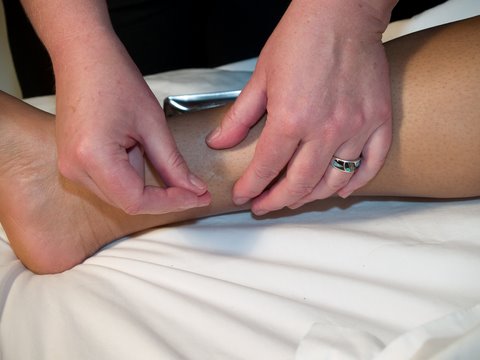Mel Hopper Koppelman is back to give us the low down on 2 important acupuncture studies.
This is part two of my interview with MHK, if you missed part one go here now.
JD: What do you think are the most important acupuncture research studies to come out in the last 2-3 years?
Why are these studies so important from your perspective?
MHK: The first study I want to highlight is the Individual Patient Data Meta-analysis on Acupuncture for Chronic Pain published by the Acupuncture Trialists’ Collaboration in 2012
The key thing about this study is that it overcomes most of the common short-comings of trials on acupuncture.
The vast majority of acupuncture trials don’t have enough patients in them – in research lingo, we’d say that they’re ‘underpowered’. When studies are too small, there’s a high chance of finding no difference between two treatments even when there really is one.
This study analyzed data from nearly 18,000 patients and provides strong evidence for the superiority of acupuncture over ‘sham.’
Unlike a normal meta-analysis, that compares the summary data from different trials, these researchers actually hunted down the original data so they could properly crunch the numbers.
I believe they’re actually in the process of updating this with studies that have been published since 2012.
JD: Very cool, I remember when that study came out, the volume of participants is impressive. What about the second study?
MHK: The second study is a mechanism study, which examines how acupuncture works.
This one looked at the anti-inflammatory effects of acupuncture using two groups of mice. The first group were normal mice but the second group were specifically bred to not be able to produce a natural anti-inflammatory molecule called interleukin-10.
JD: What is interleukin-10 and why is it important?
MHK: Interleukin-10 regulates the immune system and can turn down inflammation, which is the cause of most chronic disease.
What this study showed was that manual acupuncture on the acupoint Spleen 6 (an acupuncture point near the inside of the lower leg, pictured to the right) reduced pain and swelling, increased IL-10 (interleukin-10, the anti-inflammatory cytokine), and had an overall anti-inflammatory effect in the normal mice.
But in the second group of mice, who couldn’t make the anti-inflammatory, acupuncture on Spleen 6 did not reduce inflammation or swelling, indicating that IL-10 is important in the anti-inflammatory effects of acupuncture.
What’s cool about this study is that it total crumbles the whole ‘acupuncture is just a placebo’ perspective. It demonstrates a clear, biochemical mechanism for acupuncture that has nothing to do with expectation or belief.
JD: I love it! Thank you again!
Mel Hopper Koppelman is the Executive Vice President of the Acupuncture Now Foundation. She is an acupuncturist and Functional Medicine practitioner based in Leicester, UK.
She received her BSc from NYU in 2005, her MSc from the Northern College of Acupuncture, York in 2012 and a second MSc from the University of Western States in Nutrition and Functional Medicine in 2015. She is a reviewer for a number of peer-reviewed medical journals.


